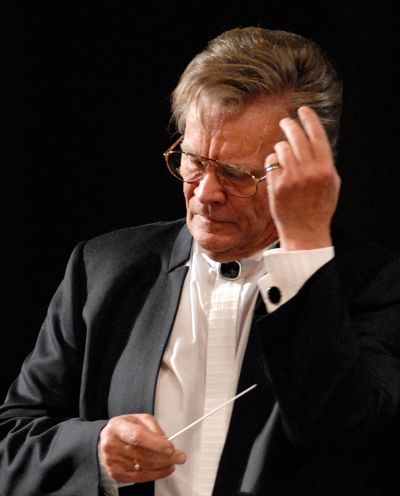 Switzerland Beethoven, Tchaikovsky, Tchaikovsky Symphony Orchestra Moscow, Vladimir Fedoseyev (conductor), Teo Gheorghiu (piano), Tonhalle, Zurich, 27.10.2012 (JR)
Switzerland Beethoven, Tchaikovsky, Tchaikovsky Symphony Orchestra Moscow, Vladimir Fedoseyev (conductor), Teo Gheorghiu (piano), Tonhalle, Zurich, 27.10.2012 (JR)
Beethoven: Overture Leonore No. 3
Piano Concerto No. 1
Tchaikovsky: ““Manfred” Symphony

The Tchaikovsky Symphony Orchestra Moscow appropriately came to Zurich bringing a pre-winter chill and a deluge of snow with them. The concert was financed by Swiss retail giant Migros (a sort of Swiss Sainsbury’s) who have as their aim the promotion of young Swiss talent and bringing foreign orchestras to tour around the principal Swiss cities.
I still cannot get used to this orchestra’s “new” name redolent of the Albert Hall (outside the Proms season) on a Saturday night with live cannons. Before 1994 they were the much respected Moscow Radio Symphony Orchestra and were fortunate to have Gennadi Rozhdestventsky as their Principal Conductor for many years. Since 1974 the orchestra has been under the baton of Vladimir Fedoseyev.
The first half evening’s concert was devoted to Beethoven. The rather stereotypically dour-looking Russians gave a gutsy performance of Leonore No. 3; despite some rough edges, and Beethoven sounding like Tchaikovsky at times, they gave more than a commendable performance and certainly pleased the crowd. The off-stage trumpet was, sadly, virtually inaudible. Did someone forget to open a door?
Beethoven’s First Piano Concerto was then performed by Teo Gheorgiou, 20 years old, born in Zurich, who not unnaturally seemed stiff and nervous at times and occasionally failed to imbue the music with much character. There was however no doubting his technical ability, right from the very first nimble and nuanced entries, but the performance as a whole was competent rather than inspired. The Russian orchestra with its less than mellow woodwind failed to sound quite like the right accompanists.
After the interval the sound of the orchestra was, however, ideal for the ”Manfred” Symphony and they clearly knew the work like the back of their hands. Based on a poem by Lord Byron (“mad, bad and dangerous to know” according to his second wife) Tchaikovsky wrote this piece upon urging by Balakirev. Tchaikovsky did not, in the end, much like it and many critics and musicologists have highlighted its failings. The impressive end of the first movement took away the audience’s breath (the tub-thumping young timpanist was particularly eye-catching), but that’s the best part of the symphony over. The second movement, where Manfred meets an Alpine fairy next to a waterfall, is delicate and charming, but the third movement, an Andante, lacks any memorable melodies, and the wild unbridled Finale where Manfred meets his death in the underworld, allegro con fuoco, more or less repeats with a crash bang and a wallop the very tune from the first movement. It was all good family fun and the audience’s partial ovation was well rewarded with two entertaining encores.
John Rhodes